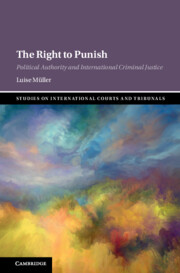Book contents
- The Right to Punish
- Studies on International Courts and Tribunals
- The Right to Punish
- Copyright page
- Contents
- Acknowledgements
- Abbreviations
- 1 Introduction
- 2 The Permissibility of Punishment
- 3 The Authority to Punish
- 4 Legitimate Authority and International Institutions
- 5 Fairness, Equality, and Democratic Authority
- 6 Conclusion
- Works Cited
- Index
4 - Legitimate Authority and International Institutions
Published online by Cambridge University Press: 16 May 2024
- The Right to Punish
- Studies on International Courts and Tribunals
- The Right to Punish
- Copyright page
- Contents
- Acknowledgements
- Abbreviations
- 1 Introduction
- 2 The Permissibility of Punishment
- 3 The Authority to Punish
- 4 Legitimate Authority and International Institutions
- 5 Fairness, Equality, and Democratic Authority
- 6 Conclusion
- Works Cited
- Index
Summary
In this chapter, I discuss in what sense and to what extent institutions have political authority. I take institutions with legitimate authority to be justified in wielding political power, where this political power is backed by the threat of coercion. Against the position that international institutions are not coercive, I claim that applying an adequate conception of coercion – which takes the concept of enforcement as paradigmatic for coercion, rather than the concept of pressure – enables us to understand some international institutions as coercive. It also lays open the assumption that a single conception of authority applied to all international institutions misconceives the diversity in aims and purposes of international institutions. Institutions that coordinate morally mandatory aims and institutions that coordinate mutual advantage can both be plausibly understood as coercive, even though their authority differs in scope and in what standards they must satisfy. Finally, I discuss whether the standard of state consent is appropriate for international institutions: while it is plausible for institutions that coordinate mutual advantage, it is implausible as a standard of legitimacy for institutions that coordinate morally mandatory aims – such as institutions of international criminal justice.
Keywords
- Type
- Chapter
- Information
- The Right to PunishPolitical Authority and International Criminal Justice, pp. 75 - 108Publisher: Cambridge University PressPrint publication year: 2024

